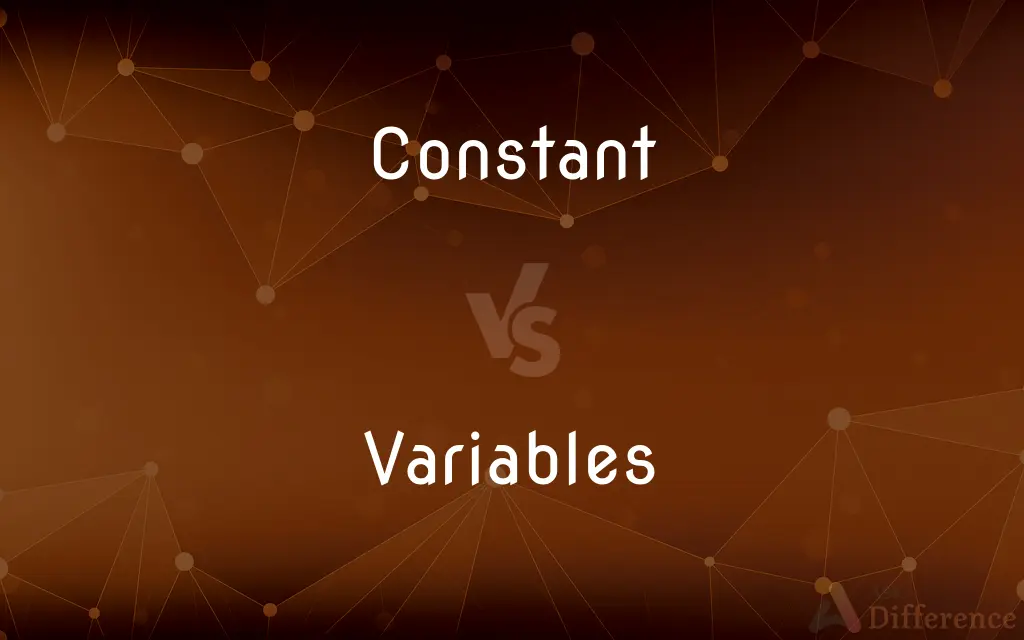Constant vs. Variables — What's the Difference?
A constant is a value that does not change during the execution of a program, while a variable is a storage location that can hold different values during a program's execution.

Difference Between Constant and Variables
Table of Contents
ADVERTISEMENT
Key Differences
Constants are fixed values that do not change throughout the life of a program. They are used to represent values that remain constant, such as π (Pi). Variables, on the other hand, are used to store data that can be changed during program execution. They are named storage locations that can hold different types of data.
In programming, constants are often defined at the start and retain the same value, which makes the code more readable and easier to maintain. For example, defining a constant for the value of gravity in a physics simulation. Variables are essential for dynamic programming, as they allow the storage and manipulation of data values, such as user inputs or calculation results.
Constants can make a program more efficient by not requiring the program to repeatedly calculate a known value. They also reduce the risk of accidental modification of values. Variables, in contrast, provide flexibility, allowing programs to process and respond to different inputs and conditions.
The use of constants is a good practice when a value is used multiple times throughout a program and should not be modified. Variables are used where values are subject to change, like counters, user inputs, and temporary storage of calculation results.
In many programming languages, constants are declared using specific keywords like const or final, and attempting to change their value will result in an error. Variables are declared with variable data types and can be modified freely throughout the program.
ADVERTISEMENT
Comparison Chart
Definition
A fixed value that does not change
A storage location that holds changeable data
Mutability
Immutable (cannot be changed)
Mutable (can be changed)
Usage
Represent fixed values like π or gravity
Store and manipulate data
Declaration
Declared with const or final keywords
Declared with variable data types
Role in Programming
Enhance readability and efficiency
Provide flexibility and dynamic data handling
Compare with Definitions
Constant
An unchangeable value.
The speed of light is a constant in physics equations.
Variables
A storage location with a changeable value.
The variable 'count' keeps track of the number of iterations in a loop.
Constant
Declared with a specific value.
We use a constant to represent the number of days in a week.
Variables
Used for dynamic values in programming.
We use a variable to store user input in the program.
Constant
Used for values that are known and fixed.
PI is a mathematical constant used in our calculations.
Variables
Holds different data types.
Variables can store integers, floats, or strings.
Constant
Immutable during a program's execution.
Constants like MAX_SIZE are set at the beginning and do not change.
Variables
Mutable during a program's execution.
The variable 'total' updates its value as we add items to the cart.
Constant
Enhances code readability.
Using constants for fixed values makes our code more understandable.
Variables
Named for easy identification.
Each variable, like 'temperature', is named for its specific use.
Constant
Not changing or varying; continuous
A constant gentle rain.
Drove at a constant speed.
Variables
Likely to change or vary; subject to variation; changeable.
Constant
Happening regularly or repeatedly; continual
The constant barking of the dog next door.
Constant interruptions.
Variables
Inconstant; fickle.
Constant
Unchanging in nature, value, or extent; invariable
A constant wind speed.
Variables
(Biology) Tending to exhibit genetic variation or variation in a physical trait
Geographically variable color patterns.
Constant
Steadfast in purpose, loyalty, or affection; faithful
A constant friend.
Variables
(Mathematics) Having no fixed quantitative value.
Constant
Something that is unchanging or invariable.
Variables
Something that varies or is prone to variation.
Constant
A quantity assumed to have a fixed value in a specified mathematical context.
Variables
(Astronomy) A variable star.
Constant
An experimental or theoretical condition, factor, or quantity that does not vary or that is regarded as invariant in specified circumstances.
Variables
A quantity capable of assuming any of a set of values.
Constant
Unchanged through time or space; permanent.
Variables
A symbol representing such a quantity. For example, in the expression a2 + b2 = c2, a,b, and c are variables.
Constant
Consistently recurring over time; persistent.
Variables
Plural of variable
Constant
Steady in purpose, action, feeling, etc.
Constant
Firm; solid; not fluid.
Constant
(obsolete) Consistent; logical.
Constant
Bounded above by a constant.
Constant time
Constant space
Constant
That which is permanent or invariable.
Constant
(algebra) A quantity that remains at a fixed value throughout a given discussion.
Constant
(science) Any property of an experiment, determined numerically, that does not change under given circumstances.
Constant
(computing) An identifier that is bound to an invariant value; a fixed value given a name to aid in readability of source code.
Constant
Firm; solid; fixed; immovable; - opposed to fluid.
If . . . you mix them, you may turn these two fluid liquors into a constant body.
Constant
Not liable, or given, to change; permanent; regular; continuous; continually recurring; steadfast; faithful; not fickle. Opposite of changeable and variable.
Both loving one fair maid, they yet remained constant friends.
I am constant to my purposes.
His gifts, his constant courtship, nothing gained.
Onward the constant current sweeps.
Constant
Remaining unchanged or invariable, as a quantity, force, law, etc.
Constant
Consistent; logical.
Constant
That which is not subject to change; that which is invariable.
Constant
A quantity that does not change its value; - used in countradistinction to variable.
Constant
A number whose value, when ascertained (as by observation) and substituted in a general mathematical formula expressing an astronomical law, completely determines that law and enables predictions to be made of its effect in particular cases.
Constant
A number expressing some property or condition of a substance or of an instrument of precision; as, the dielectric constant of quartz; the collimation constant of a transit instrument.
Constant
A data structure that does not change during the course of execution of a program. It may be a number, a string, or a more complex data structure; - contrasted with variable.
Constant
A quantity that does not vary
Constant
A number representing a quantity assumed to have a fixed value in a specified mathematical context;
The velocity of light is a constant
Constant
Persistent in occurrence and unvarying in nature;
Maintained a constant temperature
A constant beat
Principles of unvarying validity
A steady breeze
Constant
Continually recurring or continuing without interruption;
Constant repetition of the exercise
Constant chatter of monkeys
Constant
Steadfast in purpose or devotion or affection;
A man constant in adherence to his ideals
A constant lover
Constant as the northern star
Constant
Uninterrupted in time and indefinitely long continuing;
The ceaseless thunder of surf
In constant pain
Night and day we live with the incessant noise of the city
The never-ending search for happiness
The perpetual struggle to maintain standards in a democracy
Man's unceasing warfare with drought and isolation
Unremitting demands of hunger
Common Curiosities
What is a variable in programming?
A named storage location that can hold different values throughout a program.
How are constants declared?
Constants are declared using keywords like const or final, along with their value.
Why are variables important in programming?
They allow a program to store and manipulate data dynamically.
Can a constant be changed in a program?
No, once set, a constant’s value cannot be altered.
What is a constant in programming?
It's a fixed value that does not change during the program’s execution.
What types of data can a variable hold?
Variables can hold various data types, including integers, floats, strings, and booleans.
Can a program have no variables?
It's possible, but most programs will use variables for dynamic data handling.
Do constants improve program performance?
They can, by eliminating the need for recalculating known values.
Are constants always numerical?
No, constants can represent any fixed value, not just numbers.
How do I choose a name for a variable?
Variable names should be descriptive of their purpose, like totalCost or userAge.
When should I use a constant instead of a variable?
Use a constant for values that you know will not change and are used repeatedly.
Can variables change type during execution?
In some programming languages, yes, but in strongly typed languages, the type of a variable is fixed.
Are constants necessary in programming?
While not always necessary, they are useful for code clarity and maintaining fixed values.
Is it possible to convert a variable into a constant?
Once a variable is declared, it cannot be converted into a constant; a new constant must be declared instead.
Can a variable store multiple values at once?
A single variable typically holds one value, but arrays or lists can store multiple values.
Share Your Discovery

Previous Comparison
Dipole Dipole Forces vs. London Dispersion Forces
Next Comparison
Carbohydrates vs. Fats













































